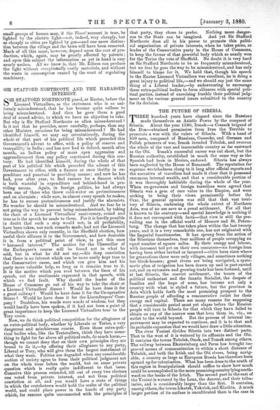THE FUTURE OF SIBERIA. T HREE hundred years have elapsed since
the Russians made themselves an Asiatic Power by the conquest of Siberia. About the year 1580, Irmak—a Cossack brigand of the Don—obtained permission from Ivan the Terrible to prosecute a war with the rulers of Siberia. With a band of 850 men, composed of Russians, Cossacks, and German and Polish prisoners of war, Irmak invaded Tobolsk, and overran the whole of the vast and inaccessible country as far eastward as the Obi. Irmak's successful career was cut short, but the Russian authority, established in much the same way as the Spanish had been in Mexico, endured. Siberia has always been neglected by the House of Romanoff. The reputation for supreme wretchedness clung to it long after official reports and the narrative of travellers had made it clear that it possessed enormous internal wealth, and that a considerable portion of it was thoroughly habitable during the whole of the year. When ex-governors and foreign travellers were agreed that Siberia was a gem of rare value to the Empire, and were seeking to bring their views prominently before the Czar, the general opinion was still that that vast terri- tory of Siberia, embracing the whole extent of Northern Asia, was of no use save as a penal settlement. For all that is known to the contrary—and special knowledge is nothing if it does not correspond with facts—that view is still the pre- vailing one in the official world of Moscow and St. Peters- burg. The change that has taken place within the last twenty years, and it is a very remarkable one, has not originated with the Imperial functionaries. It has sprung from the action of the Siberians themselves, four millions of people occupying an equal number of square miles. By their energy and labour, with incessant toil yet on their own resources—no foreign loan having been either invited or incurred—cities have risen where for generations there were only villages, and sometimes nothing but block-houses ; great rivers are being navigated, a syste- matic plan of irrigation has been drawn up and in part carried out., and an extensive and growing trade has been fostered, until at last Siberia, the convict settlement, the bourn of the political enthusiast and the fanatic Socialist, the despair of families and the hope of none, has become not only a country with what is styled a future, but the province in Asia which holds forth the most promising prospect to the Russian people of affording a remunerative outlet for their energy and capital. There are many reasons for supposing that a considerable period must yet elapse before the Russian people will turn to Siberia for that which they have failed to obtain on any of the narrow seas that hem them in, viz., an outlet to the world beyond. But the process of internal im- provement may be expected to continue, and it is to that and its probable expansion that we would here draw a little attention. The river Yenisei divides Siberia into two distinct parts. That to the west of it is watered by its affluents and the Obi. It contains the towns Tobolsk, Omsk, and Tomsk among others. The railway between Ekaterinburg and Perm has brought im- proved means of communication to within a short distance of Tobolsk, and both the Irtish and the Obi rivers, being navig- able, a country as large as European Russia has therefore been opened up for colonisation. What has been done to the south of this region in Semipalatinsk should suffice to show how much could be accomplished in the more promising country lying north- ward on the banks of the Irtish. The second part to the east of the Yenisei is watered by the Lena, the Amour, and their tribu- taries, and is considerably larger than the first. It contains, among others, the towns Irkutsk, Yakutsk, and Kiachta. A much larger portion of its surface is uncultivated than is the case in West Siberia, but there can be no doubt that it has the greater natural wealth of the two. Not to speak of the celebrated mines of Nerchinsk, the whole vicinity of Lake Baikal is a reservoir of coal, lead, iron, and other precious metals. The trade of Kiachta is the greatest in Siberia. That town is the key of the caravan route to Pekin. The overland trade which is, and has been for a hundred years, carried on between China and the cities of Russia in Europe, all passes from Maimachin, the Chinese frontier town, to Kiachta, and thence through Siberia to Moscow and Nijni Novgorod. It is the one trade avenue of which Russia possesses undisputed possession. The cost of transport is so great, however, that no solid benefit is derived from the monopoly, and several generations must pass away before the two thousand miles that inter- vene between Orenburg and Kiachta will have been bridged by means of either a railway or steam-tram- way. Schemes have, however, been proposed for the con- nection of the three chief rivers by means of a canal, to be flooded by the waters of the great lake Baikal. There are sanguine people who believe that this could be achieved at a cost which, comparatively to the end to be obtained, would be insignificant ; but, under the most favourable circumstances, it would be a matter of the greatest difficulty, not so much to construct the three short canals necessary as to make the upper courses of these rivers navigable, when once their volume of water had been increased from Lake Baikal. The first essential for the promotion of the welfare and material prosperity of Siberia is certainly the improvement of the means of com- munication, and the great rivers which find their origin in the Altai, and make their way to the icebergs of the Arctic Ocean, afford the most promising and the most economical mode of attaining the objects that are desired.
The successful journey of Professor Nordenskiold serves to give more practical significance to the lessons that may be deduced from considering the growing wealth and improving prospects of Siberia. The great rivers have acquired a fresh value to the inhabitants of that country, because they enable them to send their produce to the sea,—that sea which had ever before been an iron barrier both for them and for those who ventured into those waters from without. But it has now been conclusively shown that by the exercise of a large amount of skill, that barrier can be pierced. For nearly three months in the year the barrier is no barrier, and thus sufficient time is obtained for a well-appointed steamer to make the journey to the mouth of, or even for some distance up, these rivers, take in its cargo, and return to London or any other European port. It is true that the ship must be properly equipped for the adventure, but that is a very small drawback. It is hardly necessary to insist upon the obvious fact that the most important consequence of the assured suc- cess of Professor Nordenskiold's route would be the vast im- pulse it would give to the internal growth of a practically boundless country, capable of producing corn in almost inex- haustible quantities, and at a price fabulously cheap, and con- taining in its bosom mineral wealth of all descriptions, to which the mines of England would bear but a very insignificant proportion. The rivers mentioned are already navigated by - steamers, and shippers need have no anxiety lest on reaching Yeniseik, or any of the other harbours, there should not be a sufficiently remunerative cargo to load their ships with. Not only would there be no difficulty or risk in this respect, but there is a magnificent market at those places for many English productions, and by way of an instance, it may be mentioned that salt, which sells in London for about fifteen shillings a ton, is purchased by the Siberians in any quantities at £15 for the same weight. In the course of time, should the trade prosper, as there is good reason to believe it will, there will certainly be seaports, worthy of the name, on that solitary northern shore. The resources of Siberia will be developed, and the surplus productions, not only of Russian territory, but also of Chinese, will seek the new vent that has been pro- vided for them. It would be puerile to discuss the changes that such a revolution in the relations of countries might produce ; but it may be expected that the views of the Russian Govern- ment on the subject of Siberia will now speedily undergo a con- siderable change. Russian energy must find a vent somewhere. No reasonable man can expect that one of the most rapidly advancing peoples in the world will always be reconciled to being shut in like a second-rate Power. But from the admitted facts, it would almost seem as if Russian statesmen had purposely shut their eyes to the existence of the great field that has always been open to them and their country in their largest and oldest dependency.











































 Previous page
Previous page